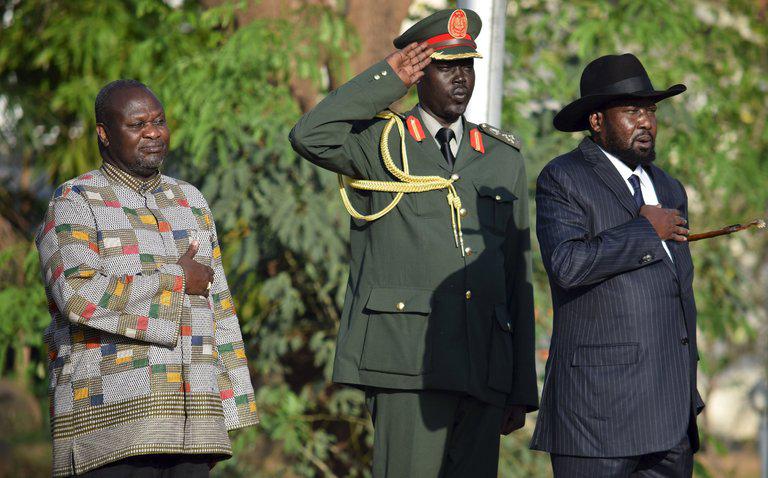
President Salva Kiir of South Sudan, right, with the opposition leader, Riek Machar, left, as Mr. Machar was sworn in as vice president in Juba, capital of South Sudan, on April 26, 2016. © 2016 Reuters
(Nairobi) – South Sudanese leaders should not undermine their efforts to bring an end to the country’s devastating conflict with an amnesty for war crimes and crimes against humanity, Human Rights Watch said.
The parties to the conflict signed a peace agreement on August 5, 2018, in Khartoum, agreeing to new power sharing arrangements and a timetable for further talks. On August 8, President Salva Kiir offered a “general amnesty” to heads of armed groups involved in the nation's five-year civil war as part of the agreement to end the fighting.
“Amnesty for atrocities not only conflicts with South Sudan’s international obligations, but experience shows it is no way to build a lasting peace,” said Elise Keppler, associate international justice director at Human Rights Watch. “While South Sudan’s leaders may aim to provide assurances to opponents, they should make clear that the amnesty does not cover grave crimes by all parties since the conflict began.”
International law requires prosecuting those responsible for serious crimes, such as crimes against humanity and war crimes, to ensure victims’ rights to truth, justice, and an effective remedy, along with combating impunity. South Sudan has also ratified treaties such as the Convention against Torture, which provide for prosecution of people allegedly responsible for serious crimes. Because the United Nations takes the position that amnesties cannot be granted for serious crimes under international law, it will not endorse peace agreements that provide for such amnesties. The African Commission on Human and People’s Rights has also rejected amnesty for serious crimes.
South Sudan’s leaders have a history of providing de facto blanket amnesty to opponents as part of peace deals, even prior to the country’s independence in 2011. The resulting lack of justice has contributed to the country’s deepening social and ethnic divisions, and fueled violence and abuses. Human Rights Watch has previously urged mediators and South Sudanese leaders to ensure that peace deals did not include any amnesty for serious crimes.
Since the new conflict started in December 2013, continued fighting and abuses by government and opposition forces, and their aligned militias have forced more than 2 million people to flee the country. The fighting has displaced more than another 2 million people within the country, with more than 200,000 still in UN sites established to protect civilians.
Despite provisions in the August 2015 Agreement on the Resolution of Conflict in South Sudan (ARCSS) that envision a hybrid court to prosecute international crimes, South Sudan’s transitional government has not made genuine progress toward setting up the court. A memorandum of understanding on the court with the African Union (AU) has yet to be signed, and domestic legislation is yet to be adopted.
Under that agreement, the AU Commission has the authority to establish the hybrid court with or without the engagement of the South Sudanese government. The AU should proceed with creating the court on its own, unless the memorandum of understanding is immediately signed, Human Rights Watch said.
“The lack of accountability for serious crimes is a cause of South Sudan’s crisis, not a solution,” Keppler said. “Survivors of atrocities in South Sudan are strongly demanding justice. Their leaders should take urgent steps to make the hybrid court a reality as efforts to end the conflict continue.”
Newer articles:
- Protecting Civilians is Key for Achieving Peace in South Sudan - 12/08/2018 15:24
- Why South Sudan peace deal could be an illusion - 11/08/2018 18:00
- Cows and conflict: South Sudan's 'slow motion' livestock crisis - 11/08/2018 05:16
- West: South Sudan peace process unrealistic - 11/08/2018 02:33
- Analysts Warn of Overly Bloated South Sudan Government - 10/08/2018 12:27
Older news items
- Analysts Warn of Overly Bloated South Sudan Government - 10/08/2018 12:27
- S. Sudan peace deal 'not realistic', international backers warn - 10/08/2018 10:42
- US Cheers South Sudan's Progress Toward Peace, Expects 'Long Process' - 09/08/2018 19:05
- In Uganda’s Refugee Camps, South Sudanese Children Seek the Families They’ve Lost - 09/08/2018 12:17
- South Sudan president Kiir grants Machar, other rebels amnesty - 09/08/2018 02:00
Latest news items (all categories):
- إلى متى ينظر الجميع إلى الفيل و يطعنون ظله..؟ - 15/05/2024 21:51
- SOUTH SUDAN - Peace negotiations in Kenya: Not everyone is convinced of the initiative - 14/05/2024 20:40
- ‘Difficult choices’: The particular vulnerability of children with disabilities in South Sudan - 14/05/2024 20:35
- Uganda in talks with China's Sinohydro over power line to South Sudan - 14/05/2024 20:31
- What South Sudan Can Learn from Neighboring Gold Producers - 14/05/2024 20:27
Random articles (all categories):
- UN Security Council threatens action against South Sudan - 17/07/2014 08:44
- A letter to warring parties - We need peace - 22/06/2015 14:00
- South Sudan: UN deploys peacekeepers to enable aid delivery to Upper Nile's Aburoc area - 07/05/2017 07:04
- Natsios' Call for Arming South Sudan Reveals Western Plot against the Region: NCP - Sudan Vision - 13/05/2012 23:21
- Pearson: South Sudan feels hit as COVID cuts support to aid groups - 04/02/2022 10:43
Popular articles:
- Who is the darkest person in the world, according to Guinness World Record? - 25/10/2022 02:34 - Read 35387 times
- No oil in troubled waters - 25/03/2014 15:02 - Read 21875 times
- School exam results in South Sudan show decline - 01/04/2012 17:58 - Read 20767 times
- NDSU student from South Sudan receives scholarship - In-Forum - 29/09/2012 01:44 - Read 17444 times
- With prisons full, South Sudan to introduce mobile courts to clear backlog of cases - 11/10/2012 11:29 - Read 14231 times
